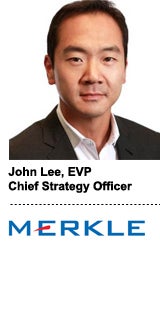 Merkle, which bills itself as one of the industry’s largest privately held agencies, is moving beyond database services into tech territory.
Merkle, which bills itself as one of the industry’s largest privately held agencies, is moving beyond database services into tech territory.
The company on Monday launched MerkleOne, its version of a people-based marketing platform for advertisers and publishers, including inaugural sell-side partner News Corp.
“M1 will enable advertisers to bring their own data, anonymize IDs from their customers and then do an ID-level sync with publishers like News Corp. through our custom audience product,” said John Lee, EVP and chief strategy officer for Merkle.
“This will open up access to advertisers for first-look, above-the-fold premium inventory across desktop and mobile.”
News Corp.’s pursuit of more tech will result in more partnerships, evidenced by both the Merkle custom marketplace deal and News Corp.’s recent acquisition of video ad platform Unruly, said Charlie Weiss, News Corp.’s VP of ad marketplaces, on a panel Monday at Advertising Week.
Merkle expects to add another six to 12 significant publishers to MerkleOne’s roster in 2016, Lee said, along with 20 to 30 Fortune 500 advertisers that will run campaigns through the platform. Advertisers don’t have to use Merkle’s agency services to buy inventory through MerkleOne.
“We’re going to make the solution available to any advertiser through M1 if they want to buy through Accuen or Cadreon, for example,” Lee added. “It doesn’t have to be a Merkle agency.”
Merkle’s intention is to create an easier way for publishers other than Facebook to do Facebook-like audience targeting in a marketplace environment. Merkle also wants to help advertisers match their first-party data with additional second- and third-party data sets.
“Advertisers want a full view of what’s happening with their audience,” Lee said. “Marketers are not just looking for Facebook data – they’re looking for, ‘What’s the ID-level data on this individual? Did we serve an impression to this person? Which creative and device was it?’”
As such, Merkle claims its strength in a sea of Acxioms, Experians and Espilons is its close ties to advertiser first-party data, given its heritage in CRM. But there are a couple of important distinctions to make: For the most part, Merkle is relying on third-party tech integrations to form the basis of the MerkleOne platform.
The facets that are Merkle-derived are its database technology, Merkle DataSource, and a new workflow management tool that allows a marketer to log in once and access campaigns across disparate sources without toggling between platforms.
Merkle did not create its own data-management platform (DMP). It onboards advertiser data through Datalogix, and then a client typically taps one of three DMP partner platforms: Google’s AudienceCenter, Adobe AudienceManager or BlueKai, Oracle’s DMP.
“We’re not trying to build competing software assets,” Lee added. “For Google, we’ve created a pre-integration, so there’s no work to get the data to move and we’ve done out-of-the box integrations for attribution to [Adometry].”
Lee said Merkle has always maintained a robust partner strategy and considers about 100 different companies to be “capability” partners. For example, Rocket Fuel has done several DMP integrations with Merkle.
A strategic alliance partner, however, would develop solution-level IP and likely integrate with MerkleOne; possibilities include Adobe or Oracle. As such, there would be channel sales agreements where Merkle would set goals and certain thresholds that a strategic partner would have to adhere to, and vice versa.
Another way of looking at Merkle’s strategy is it’s looking to be the connector between clients’ known customer databases and the media activation component. Lee said Merkle’s Connected Recognition tool lets a marketer create an identifier in its database and then determine where they’re hitting impressions.
Although Merkle is talking about a data safe haven to enable audience matching, it’s worth noting the parallels to others who have coined the terminology “safe haven technology.” (Read: Acxiom.)
“We’re an ecosystem and service play, whereas Acxiom is more of a tech play,” he claimed. “We know how platforms connect and the privacy implications. Our experience with Facebook [as an early partner for ad server Atlas] and CRM give us that leg up.”










